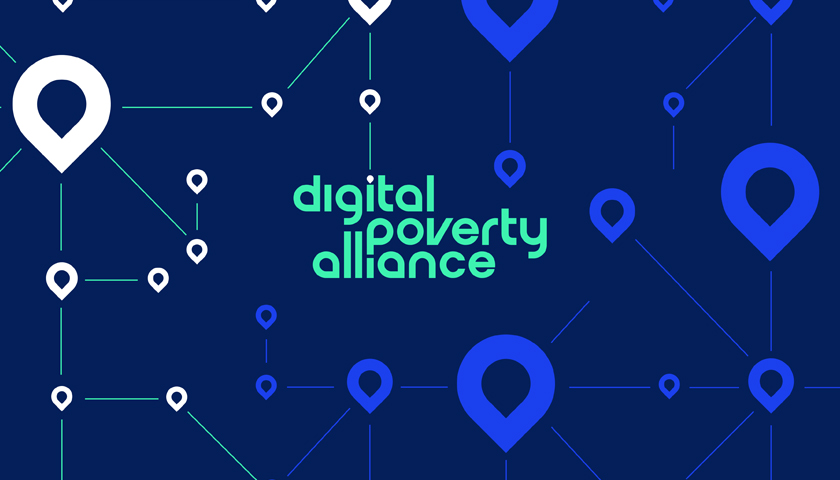The Digital Poverty Alliance, (The DPA) a charitable coalition of third, public and private sector partners working to end digital poverty, has recently launched a major Evidence Review which, for the first time, unveils the state of digital poverty in the UK and calls for more action from national bodies and local communities.
The report, UK Evidence Review 2022 – Inclusion to Equity, which was launched at the House of Lords in June 2022, finds that digital poverty is a much wider issue than just making sure people are ‘online’ or have a computer. Instead, widening differences in connection, devices, skills and experiences all play a crucial role in exacerbating inequalities and social divisions across the country, as well as introducing new ones.
The DPA’s research builds on evidence that one in five children who had been home schooling in 2021 did not have access to an appropriate device, around 11 million people in the UK lack the digital skills needed for everyday life, and, only 36 per cent of those with no formal educational qualifications use the internet, compared to 95 per cent of those with higher education qualifications. Even before the cost of living crisis, 2.5 million people were behind on their broadband bills.
It also reveals that motivation is a hugely important part of addressing digital exclusion. Put simply, if people are not able to see the benefit of engaging digitally, if it feels too difficult, or too costly, they won’t. Yet the growing stigma around not knowing how to use a computer puts people off asking for help. And with each development, there is a growing gap. Being able to use a smartphone does not mean you know how to use a computer, use digital banking or how to join a zoom meeting.
Using this evidence, the DPA community of corporate, public, government and third sector partners created five principles for solving digital poverty. These principles will guide the formation of a National Delivery Plan, pulled together by the DPA community and experts, that sets out clearly what actions need to be taken by who – and by when – to end digital poverty by 2030. The DPA is also calling on people across the UK to join the fight to end digital poverty by pledging their support and taking action.
The evidence review was funded and created with the support of a number of key partners, including Currys plc,
Elizabeth Anderson, COO, Digital Poverty Alliance, said:
“To achieve digital equity in an increasingly digital world, we need to first know what the evidence tells us. That’s why we’re launching this landmark evidence review as the first step to ending digital poverty once and for all.
And it’s not about ‘us’ or ‘them’ – all of us will fall in and out of digital inclusion based on our life circumstances.
That’s why it’s going to take bold, cross-sector efforts to make the change we need. This has to be change at a national scale – but local communities and individuals are a hugely important part of solving this. So join us – pledge your support now and be part of creating change.”
Dr Kira Allmann, author of the Evidence Review and Public Engagement Researcher, commented:
“The digital world is not a world apart – it’s completely embedded in the world we live in everyday, and this is true even for people without access. This evidence review offers a much-needed update to our understanding of the factors contributing to digital poverty in today’s pervasively digitised world. It shows that beyond the familiar online-offline divide, digital poverty is also the product of social inequalities that have been built into and exacerbated by the design of technologies and services.
“Eradicating digital poverty will depend not only on bolstering digital access and skills among the least connected, but also on cultivating a digital economy and tech sector underpinned by diversity, inclusivity, accessibility, privacy, safety, fairness and equity. This is a radical shift in how we need to think about digital poverty going forward – at this point, it’s far more than a question of simply getting more people online; it’s a question of ensuring that digitisation doesn’t deepen inequalities or introduce new forms of inequality for us all.”
Lord Jim Knight, Baron Knight of Weymouth and host of the House of Lords event, commented:
“Digital poverty is being unable to interact with the digital world when and how someone needs to. Increasingly, that means not having access to fundamentals of life. From social security, healthcare, education and training, to finding work and applying for jobs – critical services are more and more online. Because of that, digital inclusion will lessen inequalities.
Digital inclusion is no longer something that’s ‘nice to have’ – it’s an essential. Being cut off from digital isn’t just an inconvenience – it compounds and exacerbates poverty and disadvantage, increasing disconnection from society, democracy and opportunity. That’s no longer something we can ignore if we’re interested in a just society.”
Alex Baldock, Chief Executive, Currys – founding partner of the DPA said:
“Tech and connectivity are integral to our lives, yet millions of people remain offline or lack essential digital skills. Currys exists to help everyone enjoy amazing technology, and as a founder of the Digital Poverty Alliance, we’re determined to help end digital poverty by 2030. Through our work with the new Tech4Families campaign, we’re raising vital funds to provide new and refurbished laptops to families who desperately need them.”
To read the full report, please visit here: UK Evidence Review 2022 – Inclusion to Equity
